Pound wobbles after Johnson reveals plan to prorogue Parliament: as it happened

Sterling wipes away some gains on fears of Westminster shutdown
FTSE outperforms as recession fears drag European markets down
US yield curve inversion deepens as investors flee from global risk
Brexit latest news: Queen orders Parliament to be suspended for five weeks
Wrap-up: Markets remain fairly muted as Brexit battle begins

The pound looked like it was going to take a star turn today, but after a steady comeback, it managed to close less than 0.5pc down against the dollar and the euro — far from a disastrous day given the sounds coming from Westminster.
In the grander scheme of things, the currency’s drop still appears pretty steady, and the overall factors remain the same: without a deal or some other breakthrough, sterling will likely keep spiralling. There’s only so much stimulation it can be given by air-punching and warm European receptions.
The FTSE 100’s performance seemed weirdly unhinged from the pound’s today: spending much of the day in the doldrums, it actually made a comeback in line with sterling during the afternoon.
The energy sector might have been providing most of the, uh, energy, but strong performances for supermarkets also bucked recent trends. Could that mark the beginning of a shift in attitudes on certain stocks?
Of course, if you look at the single biggest mover among blue-chips, it was once again Fresnillo, which has consistently hogged the limelight on days when investors are feeling less than confident about the global economy — so it looks like the nerves are still there.
That’s all from me tonight. I’ll be back tomorrow with the latest news on business, markets and economics. Thanks to everyone who followed along and commented today!

Round-up: Pizza Express loses slice of profit, tobacco tie-up could unroll, Crown Estate backs winds farms

What do pizzas, tobacco and wind farms have in common? They’re all among this afternoon’s top UK business stories (sorry if you had been hoping for something witty):
Pizza Express profits crunched by casual dining downturn: The casual dining crunch has taken another bite out of the bottom line for Pizza Express.
Merger of tobacco giants Philip Morris and Altria faces uphill battle: My colleague Michael O’Dwyer has looked into the planned $200bn merger.
Crown Estate hands seven sites to British wind farms adding an extra 10pc to UK’s offshore capacity: Britain’s offshore wind farms are about to get bigger after the Crown Estate ruled that seven sites could comfortably expand their operations without posing any threat to the environment.
FTSE outperforms as energy giants, supermarkets and pharma stocks do some heavy lifting
The FTSE 100 closed a respectable 0.54pc up, after a session in which it’s fair to say it had to fight for every inch.
The energy titans of BP and Shell can be credited with the heavy lifting, but there was some decent weight coming from pharma stocks and supermarkets as well.
Here’s how European markets closed:
FTSE 100 up 0.35pc, or 25.13 points, at 7,114.71
France’s CAC 40 down 0.34pc, or 18.29 points, at 5,368.8
Germany’s DAX down 0.25pc, or 29 points, at 11,701.02
Spain’s IBEX up 0.21pc, or 18.2 points, at 8,747.1
Italy’s FTSE MiB flat at 0.0pc, 20,990.71 points
Negotiations in Italy are ongoing, but it is likely that President Sergio Mattarelli will grant Five Star and the Democratic Party more time if he believes they can make a coalition happen. If not, we’ll be headed for fresh elections, and that will not be pretty for Italian stocks — especially its ailing banks.
Norway fund wants rule switch to ease tech investment

Despite global economic worries, Norway’s sovereign wealth fund is still eyeing opportunities for growth. My colleague Harriet Russell reports:
The worlds largest sovereign wealth fund has called for a change to be made to rules which currently prohibit it from investing in unlisted equities, so it can better capitalise on potential growth opportunities in sectors such as US technology.
Norway’s $1 trillion (£815bn) sovereign wealth fund is currently only allowed to invest in unlisted equities if a public market listing is on the horizon, which it said meant it lost out on a number of "relevant" investment opportunities.
Its managers suggested new rules could allow the fund to invest in larger unlisted companies and that such investments could be capped at just 1pc of the total portfolio.
Nasdaq lags on Wall Street
The Brexit blow-up has caused me to neglect the US markets — apologies for that. The Dow Jones Industrial Average and S&P 500 are both up narrowly, while the tech-heavy Nasdaq is flat. None of the indices have much to move on, with the trade war’s phony peace still in place.
Deutsche Bank: ‘We retain our view that a no-deal Brexit is a 50/50 chance’
Joining the groups giving their views on possible Brexit outcomes are Deutsche Bank, who have held their prediction that there is a 50/50 chance of no-deal. They’ve produced this graphic showing the possible road ahead:
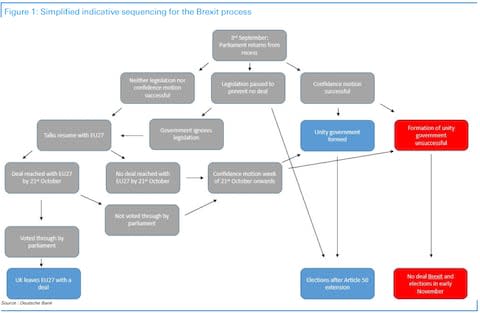
Oliver Harvey, a Deutsche analyst, writes:
Much will now depend on the strategy taken by anti no deal MPs over the next two weeks. From whatever direction, today's announcement has reduced Parliament's scope to maneuver but may also serve to crystallise parliamentary opposition to no-deal...
...In terms of indicative probabilities, we retain our view that a no-deal Brexit is a 50/50 chance, with the most likely path to preventing one from occurring the formation of a national unity government either in early September or late October.
Proroguing parliament: The road ahead
Here’s a much more fancy and detailed version of the proroguing timetable I shared earlier:

If you still want more info on the basics, the Institute for Government has put out a guide (PDF link).
And if you want the absolute latest on events in Westminster, remember to follow our politics live blog, now with Tony Diver at the helm: Brexit latest news: Queen orders Parliament to be suspended for five weeks
FTSE finds positive ground again
The FTSE 100 is back in positive territory, thanks in large part to strong performances from the heavyweight energy sector — which consists of giants BP and Royal Dutch Shell.
Shell has been subject to a few headlines today, but mainly seems to be basking in BP’s reflected glory after investors welcomed the company’s decision to shed its Alaskan operations.
The gains are similar by percentage to those coming from supermarkets (see 11:59am update), but boy do the energy giants carry some weight — the blue-chip index is 10 points positive, with BP and Shell providing 15 points of upwards pull that are making all the difference.
Greggs puffed up on FTSE 250 about buy recommendation
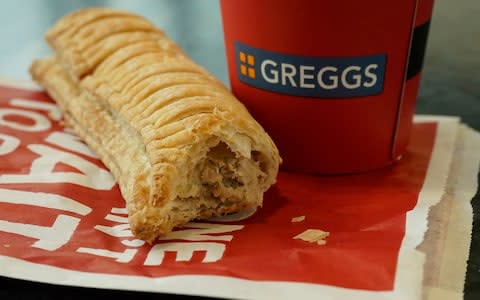
Greggs is leading risers among mid-caps today, up 3.66pc at the top of FTSE 250 climbers.
The bakery chain’s shares are up after a note from UBS analyst Heidi Richardson note this morning.
She said an expansion slowdown among Greggs’ competitors would help it grow like-for-like sales, and that the company would continue to benefit from a perception among customers that it offers good value for money.
TalkTalk is close behind at 3.55pc up, after Sky News reported a Goldman Sachs-backed broadband network was seeking to buy the provider’s FibreNation operations.
Queen approves prorogation request
The Queen has given her backing to Boris Johnson’s plan to prorogue parliament. More from the Telegraph’s Harry Yorke:
Confirmed: the Government could prorogue as early as September 9, leaving MPs with four days after returning from recess to try and block a no-deal Brexit. pic.twitter.com/KpZTfdMYFX
— Harry Yorke (@HarryYorke1) August 28, 2019
MUFG: ‘Only a matter of time’ until pound starts finding new lows
Derek Halpenny, head of research at Japanese banking giant MUFG, says Boris Johnson’s move to prorogue Parliament puts the pound on course to hit fresh recent lows, after its painful run earlier in the month and in late July. He writes:
Today’s development brings us firmly into the realms of a ‘Constitutional Crisis’. The proroguing of Parliament leaves an incredibly narrow window for Parliament to legislate the move, agree to an Article 50 extension or organise a no-confidence motion.
All of the above means no-deal Brexit is looking ever more likely. GBP downside risks will continue to plague the market. It is only a matter of time until the recent GBP/USD low of 1.2015 is brought even lower. The MUFG base case no-deal Brexit assumption and our current year-end target of 1.1000 remain intact.
Trump backs Johnson
Not the most surprising development given Donald Trump’s frequent and vocal expressions of enthusiasm for the Prime Minister.
Would be very hard for Jeremy Corbyn, the leader of Britain’s Labour Party, to seek a no-confidence vote against New Prime Minister Boris Johnson, especially in light of the fact that Boris is exactly what the U.K. has been looking for, & will prove to be “a great one!” Love U.K.
— Donald J. Trump (@realDonaldTrump) August 28, 2019
UBS: No-deal delay and General Election most likely outcome
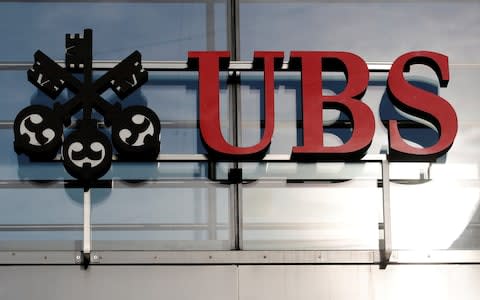
Dean Turner, an economist at top asset manager UBS, has written an assessment of the current state of affairs over Brexit. He writes:
The initial interpretation is that the government is trying to prorogue parliament to force through a no-deal Brexit. But it is not clear that this is the case: MPs will have time to debate Brexit both before and after this period...
...In our view, the risks of a no-deal Brexit on October 31 have not increased, but it should bring the situation to a head sooner. Meanwhile, sterling assets are likely to remain volatile.

As a reminder, UBS, the world’s biggest wealth manager with £2.03 trillion in investments under its auspices, has shifted to a pessimistic position on stocks for the first time since the eurozone crisis – a sign that negative sentiment is increasingly taking hold.
“Risks to the global economy and markets have increased, following a renewed escalation in US-China trade tensions,” Mark Haefele, UBS’s global chief investment officer, said in a memo to investors earlier this week.
Full report: Planes, trains, automobiles and gurnies drive WH Smith sales

This morning’s business news may feel like it was a constitutional crisis ago, but we’ve got a full report up now on WH Smith’s trading statement, which emphasised how much non-high street stores are becoming core to its operations. My colleague Laura Onita reports:
The retailer has been increasingly focusing on lucrative travel locations such as airports and railways stations, while its high street shops have seen sales dwindle in recent years.
Outgoing boss Stephen Clarke is banking on selling more stationery, which has bigger profit margins than newspapers and magazines, as well as adding post offices to its stores to keep the retail arm of the business steady.
You can read her full report here: Hospital stores prove healthy source of sales for WH Smith
Italian leftist parties developing government plans
Information is emerging in drips and drabs from high-stakes talks between Italy’s Five Star party (MS5) and the Democratic Party (PD).
The two groups, who are holding ongoing negotiations, are reportedly developing a plan of governance to present to President Sergio Mattarella.
Here’s how they could block right-wing populist League leader Matteo Salvini’s path to power:

Reminder: Tomorrow is deadline for PPI claims
Find out how to claim with the Telegraph Money team’s guide here:

Trump tweets...
The US President is awake, and thinking about China:
So interesting to read and see all of the free and interesting advice I am getting on China, from people who have tried to handle it before and failed miserably - In fact, they got taken to the cleaners. We are doing very well with China. This has never happened to them before!
— Donald J. Trump (@realDonaldTrump) August 28, 2019
And, of course, where his thoughts end up might end up having a big impact on markets (see 12:55pm update).
FTSE flips negative, Italian stocks stumble despite hopes, US futures drop
Oh dear. It’s a pretty downbeat picture across the board right now, with the FTSE 100 flipping negative as Brexit worries outweigh the pound’s fall, Italian stocks retreating as time ticks down for a government deal, and Wall Street set to fall slightly at open.
The FTSE 100 is down 0.2pc
France’s CAC 40 is down 0.94pc
Germany’s DAX is down 1.04pc
Spain’s IBEX is down 0.36pc
Italy’s FTSE MiB is down 0.36pc
Can traders outsmart political stock shocks?

Events like today’s pound drop are hard to predict, and without knowing when political news will break, it’s hard for investors to stay get ahead of major price movements.
When it comes to big Twitter-pushed movements, however, there’s one set of thumbs in town: those of US President Donald Trump.
My colleague Harriet Russell and I took a look at the impact Mr Trump can have, and what investors are doing to hedge against the impact of the President’s tweets.
Here are two of the biggest Trump hits this month:


British Chambers of Commerce: ‘Top priority for businesses and the economy is still to avoid a messy and disorderly exit from the EU’

The British Chambers of Commerce has given one of its strongest responses yet to the latest Brexit twist, with its director general Dr Adam Marshal saying:
Businesses feel like Westminster is playing an endless game of political chess, while their futures and the health of the UK economy hang in the balance.
Every move in this game is prompting more questions, not just amongst businesses here at home but also amongst their partners around the world. Out in the real world, continuing political turbulence is taking a toll on contracts, on investment decisions, and on business confidence. Three years on, the damage continues.
The top priority for businesses and the economy is still to avoid a messy and disorderly exit from the EU on the 31st of October. Despite the noise, none of the events of the last few days have given businesses greater confidence that this will be achieved. Given this, it is essential for government and its agencies to further boost support for businesses through any scenario.
Once again, businesses will have to try their best to prepare for an unclear future as the political process goes down to the wire.
Oanda’s Craig Moya adds that markets seem broadly braced for the possibility of a no-deal Brexit, but that the pound will slip sharply if the UK leaves without a deal in place:
While, we inch closer to the October 31st deadline, pound options suggest a no-deal Brexit could already be priced in. Longer-term positions on the British pound are less bearish. If Johnson does deliver a no-deal Brexit, sterling will tank 5pc easily to 1.16 initially and we could see momentum keep the pressure on all the way to 1.10.
Round-up: Shop prices fall, Ted Baker heads East, Petrofac squeezed by bribery probe

Here are some of today’s top stories, from our business reporters:
Shop prices fall at fastest pace in a year as retailers attempt to boost sales: Shop prices tumbled at their fastest rate in a year as retailers turned to heavy discounting in the face of fierce competition and weakening consumer spending.
Ted Baker hopes to be big in Japan after striking licensing deal: Fashion brand Ted Baker hopes to conquer Japan after striking an exclusive five-year licensing deal with Sojitz Infinity, a subsidiary of the sprawling Sojitz conglomerate.
Petrofac profits squeezed as SFO bribery probe weighs: A Serious Fraud Office investigation into Petrofac relating to allegations the oilfield services company used bribes to win contracts in Iraq and Saudi Arabia has put a squeeze on its core profits.
Supermarkets gain on FTSE 100 as bull brushes off Brexit worries

Supermarkets are shining on the FTSE 100, with food and staples leading the blue-chip index after an upbeat note by Investec said the sector offered “compelling value”.
Ian Gordon, an analyst at the South African investment bank, said:
Having reviewed the possible impact of Brexit-driven changes in consumer spending patterns, tariffs and supply chain disruption, we believe that the current weakness in the supermarket sector is unwarranted.
While there is currently undoubted nervousness on companies with large UK exposure, we still feel the sector offers compelling value.
The bank upgraded its rating on Morrisons to buy, from hold, and kept buy ratings on Tesco and Sainsbury’s — marking it as bullish across the whole food retail sub-group. It stayed more downbeat on Ocado, however, keeping its stock at a sell.
Mr Gordon said potential tariffs post-Brexit would “have little impact on shopping costs”, and said any disruption from supply shortages would “temporary in nature”.
He wrote:
While share price weakness in stocks with UK exposure is not unexpected as the second Brexit date approaches, we believe that the supermarket sector in particular has been oversold, possibly on the un-quantified risks discussed above. We believe that it is, therefore timely to either be positioning to buy into or increase positons in the sector in anticipation of a conclusion to, or greater visibility on, Brexit.
Tesco, which Investec said was “positioned for sustainable profit growth”, is the biggest climber of the three food giants, up 2.34pc currently.
Brexit: The key dates ahead
With Boris Johnson’s cards now firmly on the table, here’s how the parliamentary calendar coming up looks. In short, it looks like that things could run pretty close to the wire:
September 3rd: Parliament reconvenes
Around September 12th: Parliament suspended
September 22th–25th: Labour conference
September 29th–October 2nd: Conservative conference
October 14th: Queen’s Speech
October 17th-18th: European Council
October 21st–22th: Votes on Queen’s Speech
October 31st: Brexit date
Speaker John Bercow has labelled the plans a “outrage”, setting the stage for further constitutional combat:
Full Bercow statement
- constitutional outrage
- trying to stop parliament debating Brexit
- shutting down parliament an offence against the democratic process
- he’s on holiday (I was too, but I’m not anymore) pic.twitter.com/nPF0GdIXv0— Beth Rigby (@BethRigby) August 28, 2019
Analysts: ‘Fewer and fewer people believe in a Brexit deal’
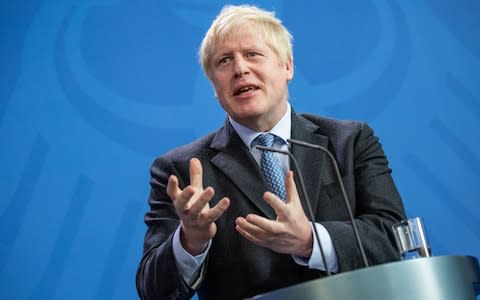
The pound is currently about 0.9pc off on the day as investors chew on the latest twist from Westminster. Here’s some reaction to Boris Johnson’s plan to suspend parliament from the City and beyond:
Edward Park, from asset management firm Brooks Macdonald, said the pound’s slide is likely to continue:
With the outcome of Brexit remaining volatile and unclear, sterling will remain under pressure and trade within a range that reflects the dual possibilities of a deal and a disruptive exit. As a result we maintain our underweight to UK assets despite the valuations on offer.
Mujtaba Rahman, a Eurasia Group analyst, said Mr Johnson’s “nuclear” shift would provoke a response from MPs opposed to no-deal:
Now that Boris has gone nuclear, it may require MPs to switch back to their own nuclear option—passing a no-confidence vote in the Government next week...
...MPs will try every trick in their book to stop Johnson’s plans and now try to pass a law in the short September session. They will likely win the backing of the Speaker John Bercow. Ultimately, the major constitutional row could be resolved in the courts.
Anahita Thoms, head of law firm Baker McKenzie's international trade practice in Germany, said the move is feeding negative sentiment on the continent:
Boris Johnson’s move to shut down Parliament is seen by the EU as a clear sign to force through a no deal Brexit. The reaction on the continent is shaking of heads, disbelief and lack of understanding. Frustration continues to spread. Fewer and fewer people believe in a Brexit deal.
Breaking: Italian PD leader to back Conte in talks
Bloomberg reports that Italian Democratic Party leader Nicola Zingaretti will back Giuseppe Conte to stay as Prime Minister during talks with the country’s Preasident.
More when I get it...
Johnson confirms terms of prorogation; Italian talks continue
It looks like we’re set for prorogation until a Queen’s Speech on the October 14th, with Boris Johnson saying suspension will begin on the 9th September.
NEW - Boris Johnson letter to all MPs: pic.twitter.com/ap79taa1Jq
— Kate McCann (@KateEMcCann) August 28, 2019
While Brexit news continues to spill forth (I’ll wrap up the salient facts shortly), let’s quickly check in with Italy.

Italian stocks surged yesterday on hopes that new elections (and all the market-unfriendly uncertainty that entails) could be avoided if the leftist Five Star (MS5) party and Democratic Party (PD) join forces to form a new government.
Talks got stuck yesterday amid reports that Democratic Party officials were unhappy with a push by Five Star to keep neutral Giuseppe Conte as Prime Minister, and make MS5 own leader, Luigi Di Maio, interior minister.
Right now, a resolution looks closer, with PD negotiators returning to their party for a vote on the current terms.
Tweet: Johnson denies prorogation is to stop no-deal block, saying there is ‘ample time’ for debate
Sky News’ Aubrey Allegretti tweets:
BREAKING:
Boris Johnson says it is "completely untrue" he is going to prorogue parliament to stop MPs blocking no-deal.
"There will be ample time on both sides of that crucial 17 October summit in parliament for MPs to debate the EU, debate Brexit and all the other issues.”— Aubrey Allegretti (@breeallegretti) August 28, 2019
Sterling drop finds a shelf
After nearly an hour of vertical descent, the pound might have found some support at around $1.219, putting it 0.9pc down on the session.
The FTSE 100 is now firmly up, with exporters buoyed by sterling’s weakness, and a mighty performance by BP, which has single-handedly chucked nearly 9 points on the index after announcing it will pull out of its Alaskan operations.
That is unlikely to be enough to keep the blue-chip index from marking August as its worst month in several years, after some sustained selling-off over the last few weeks.
Prorogation: What does it mean?
Sterling is dropping across the board against other top global currencies, down about 1.1pc against the dollar currently — its worst performance since late July, and among its worst this year.
If prorogation does occur, it means Parliament will not sit for much of September and early October — severely narrowing the window for attempts by MPs to bind Boris Johnson. Here’s an explainer:

Reports: Queen’s Speech due on October 14th, narrowing window for efforts to block no-deal
Multiple political journalists are now echoing the BBC report that the government is laying out plans for a Queen’s Speech on October 14th. That would leave rebel MPs with an incredibly narrow window to push through any laws that could prevent a no deal Brexit.
Bringing parliament back on October 14 means there is still enough time (just!) to pass a revamped Brexit deal - if agreed at the October 16 European Council - but much less time for rebels to do a Cooper-Letwin v3.
Next week is going to be a crazy ride. https://t.co/I7S8fwVznL— Sebastian Payne (@SebastianEPayne) August 28, 2019
Cabinet yet to be informed. Understand there is going to be a cabinet call this morning
— Beth Rigby (@BethRigby) August 28, 2019
Investors are unlikely to take kindly to that: in general, any sentiment that suggests no-deal is becoming more likely sends the pound sinking.
A weaker sterling does benefit the exporter-heavy FTSE 100, however, with the blue-chip index now narrowly up even as it continental peers suffer.
Progogation talk moves sterling
In case anyone needed a reminder of just how sensitive the pound is to Brexit news, a smattering of Twitter speculation that Boris Johnson is preparing to prorogue parliament has rattled the currency, wiping away most of gains it eked out yesterday.
The BBC’s Laura Kuenssberg says Downing Street is trying to play down reports that its plans are linked to Brexit:
Parliament likely to meet therefore from next Monday until around the 11th of September - understand Downing St thinks they have some legal protection from court cases if they are suspending Parliament to come back with a Queen's Speech - there is going to be HUGE row
— Laura Kuenssberg (@bbclaurak) August 28, 2019
This is clearly the defence No 10 is going to run against charges of carrying out a constitutional outrage... there is going to be nothing 'bog standard' about the arguments ahead - PM has pitted himself against Parliament before MPs back - buckle up (and hello again)
— Laura Kuenssberg (@bbclaurak) August 28, 2019
Here’s a reminder of how sterling’s tumultuous summer has looked:
You can follow the latest political updates on our other live blog: Brexit latest news: Queen could be asked to suspend parliament today
I’ll keep tracking the impact the latest developments have on markets here.
Pound sinks on BBC report Queen could be asked to prorogue parliament today
A potentially huge (if unconfirmed) report by BBC Radio 4 Today programme presenter and former political editor Nick Robinson, who tweets:
Hearing that the Queen could be asked to agree to prorogue parliament as early as today. She’s in Balmoral. Would be done by Order in Council. Only one source. Not confirmed. Watch this space
— Nick Robinson (@bbcnickrobinson) August 28, 2019
That has instantly hit the pound, which has fallen 0.4pc against the dollar and the euro to to wipe off much of yesterday’s Brexit deal hope gains.
Key US yield curve swings deeper into negative
When the two-year/10-year US bond yield curve inverted earlier this month, it send global markets to their worst day of 2019.
A negative spread between the numbers means investors are who buy longer-dated bonds are set for lower yields than those who buy shorter-dated bonds — undercutting conventional financial wisdom.
Here’s how the past month has looked for the 2yr/10yr spread.
The more striking change may well be the spread between three-month and thirty-year bonds, however (see the second Tweet in my previous post). CMC Markets’ Michael Hewson writes:
There’s been a lot of talk of yield curve inversions as a portent of an approaching recession, however the more significant development is the decline in 30 year yields below the Fed funds rate, something that has never happened before.
Bond blow-up continues
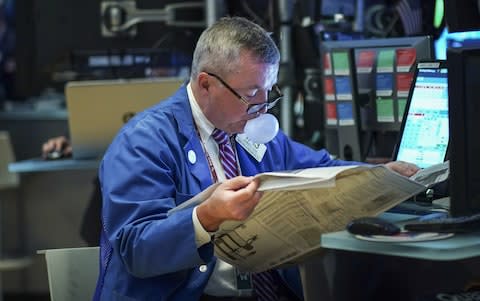
No news was good news for equities yesterday, as post-G7 cheer and promises (from Donald Trump a least) that trade talks with China would continue reassured investors.
That sentiment appears to have faded, and the elephant in the room — bond markets that have gone haywire in recent weeks — is once again becoming impossible to ignore.
Here’s my colleague Tom Rees’ report on the subject, from Monday: Record numbers seek safety in bonds as recession looms
When Wall Street trading closed on Monday, the yield spread between two-year and 10-year US bonds was still inverted, for the first time since 2007. That’s a sign the phenomenon, a reliable (but not perfect) predictor of recessions could be here to stay.

Here’s what I wrote on the subject yesterday:
Since its re-inversion on the 14th, the yield curve has actually been generally positive (read: flat), dipping back into the red a few times over the nearly two weeks since then.
If sentiment continues to drop (the curve is dictating by investors’ demand for bonds, which are usually sought-after when there is economic doubt), we should expect the curve to enter a period of sustained inversion soon.
That point may be near: the 2yr/10yr yield curve closed negative for the first time since mid-2007 (right before the financial crisis) yesterday, a sign that the negative sentiment survived the session, and meaning there’s it faces an uphill fight when Wall Street re-opens in a few hours.
Here’s three interesting ways of looking at the current bond market situation:
The total amount of the negative-yielding #debt within the Bloomberg Barclays Global Aggregate Index has reached another record-high of USD 16.8 billion. Almost 30% of all debt included in the index comes with a negative #yield. pic.twitter.com/QApaxDXf02
— jeroen blokland (@jsblokland) August 28, 2019
Totally crazy! US 30y Treasuries yields plunge to 1.93%, the lowest ever seen. This is below the level of 3mth US Bonds, which are trading at 1.95%. pic.twitter.com/vp2BdbzW67
— Holger Zschaepitz (@Schuldensuehner) August 28, 2019
From the 2-year to the 30-year, the treasury yield curve is now below 2% pic.twitter.com/kR7Rj6cOYv
— David Ingles (@DavidInglesTV) August 28, 2019
And here’s a full explanation of yield curves:

Javid outlines plans for Spending Round next week

Chancellor Sajid Javid has written for the Telegraph today, outlining his plans for next week’s Spending Round, which will be aimed at preparing the UK for Brexit. He writes:
We need to focus relentlessly on making sure we’re ready to leave the EU on 31st of October, whatever happens. So next week’s Spending Round will be about clearing the decks to allow us to focus on Brexit.
You can read his full piece here: Next week’s Spending Round will clear decks to let us focus on Brexit
The Spending Round will take place on 4th September:
☑delivering our spending promises quickly
☑clearing the decks to focus on #Brexit
☑giving departments certainty over next year's budgets
Read more ���� https://t.co/efHoi7JG7A— Sajid Javid (@sajidjavid) August 28, 2019
European markets drop into red at open
European equity markets have opened in the red, with France’s CAC leading fallers at 0.55pc down. The FTSe, aided by a fall in the pound this morning, has slightly narrower losses, off around 0.35pc currently. The continent-wide STOXX 600 is off around 0.35pc.
WH Smith given some altitude by airport stores
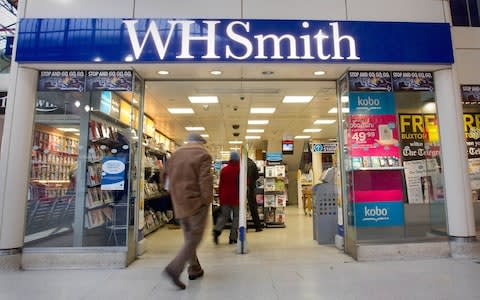
WH Smith confirmed it remains on course to meet full-year predictions after its travel hub and hospital stores performed strongly.
In a number-light trading update this morning, the company said its international business, including recently-acquired former rival InMotion, “continues to grow strongly”.
It added its high street business was also continuing to perform in-line with expectations amid cost-saving efforts.
RBC analyst Richard Chamberlain said the update should be “broadly reassuring for the market”, adding that he expected more details on the firm’s cost-cutting and expansion plans in its full-year results.
Thomas Cook rescue deal
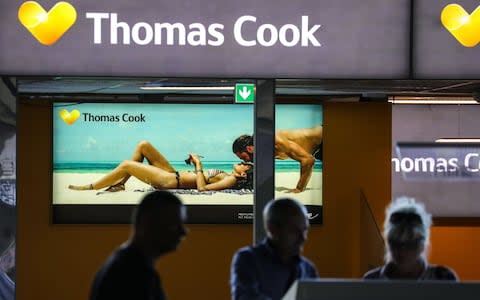
A little bit of breaking news this morning: Thomas Cook has reached “substantial agreement” with Chinese conglomerate Fosun and its creditors on the key terms of a rescue deal for the ailing travel company that could see shareholders all but wiped out.
The agreement would see Fosun, Thomas Cook’s largest shareholder, pump an additional £450m into the company and acquire a minimum of 75pc of its tour operator business and 25pc of its airline.
Michael O’Dwyer has more: Thomas Cook shareholder Fosun to pump in £450m to rescue airline
What happened overnight
Asian markets swung on Wednesday, gripped by uncertainty over the China-US trade talks, with warnings that Donald Trump’s unpredictability could be harming the chances of an eventual agreement.
Trading has been volatile this week after the president’s outburst against Beijing and announcement of more tariffs on $550bn of goods on Friday was followed on Monday by him saying the two sides had spoken by phone and negotiations would resume soon.
However, China has not confirmed such calls had taken place, while media in the country has played down the chances of more talks and the leadership’s need for a deal.
In share trading Hong Kong and Sydney each edged up 0.1pc, Tokyo ended the morning 0.2pc higher and Seoul was up 0.6pc. China's yuan edged up slightly after a recent sharp sell-off but it remains lodged around 11-year lows.
Agenda: Markets await clearer signals on trade war

Good morning. US stock markets ended lower yesterday amid uncertainty over any progress in trade negotiations between the United States and China.
The FTSE 100 dragged after a big day for the pound, which climbed strongly against the euro and dollar. We will be looking to see if sterling can keep up gains over the next couple of days.
5 things to start your day
1) Shop prices have fallen at the fastest pace in a year as retailers attempt to boost sales. The pressure on high street stores increased in August after the price of non-food items slipped 1.5pc year-on-year as retailers attempted to lure in more cautious shoppers, data from the British Retail Consortium revealed.
2) BP is selling its entire Alaska business to private oil and gas firm Hilcorp Energy for $5.6bn (£4.6bn), ending six decades of operating in the US state. The move comes as the British oil major is planning to divest $10bn of assets over the next two years to strengthen its balance sheet and pay for its acquisition of BHP’s US shale assets.
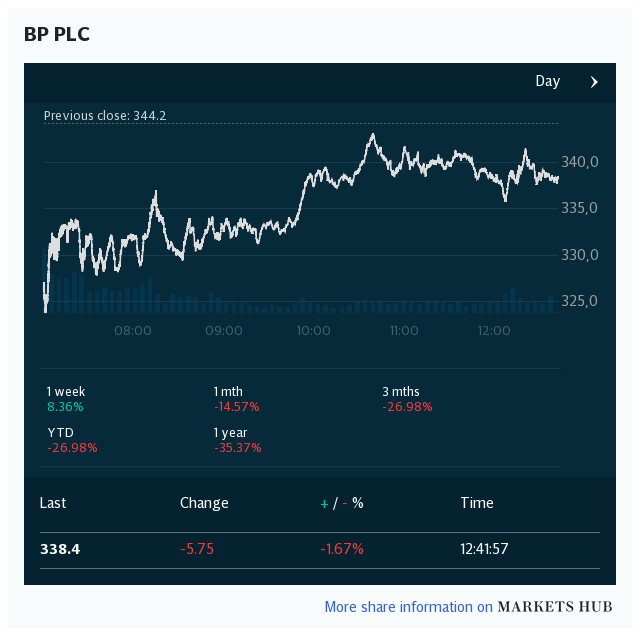
3) Philip Morris is in talks to reunite with Marlboro maker Altriain a merger that would create a global tobacco behemoth worth more than $200bn. The potential all-share deal with the cigarette maker, which owns the rights to Marlboro outside the US, and Altria come more than a decade after investor pressure over the threat of litigation and regulation prompted the two businesses to split.
4) Digital tax fears to blame for faltering tech deals: Data released by PitchBook show that the threat of digital taxes and tougher scrutiny of technology tie-ups has caused tech deals to dry up in the UK this year. Europe as a whole is on track for its quietest year since 2009.

5) Johnson & Johnson could face tens of billions in liabilities for its part fuelling the opioid epidemic sweeping the US after a court in Oklahoma ordered the drugs giant to pay $572m (£466m) for deceptively marketing the addictive painkillers. The decision could open the floodgates for a raft of similar awards against J&J and other opioid makers.
Coming up today
WH Smith has a trading statement out today. Last year, it bought InMotion, an airport retail rival, as the high street perennial makes a bid to conquer the travel retail sector by colonising airports and train stations. As Hargreaves Lansdown’s Laith Khalaf points out, “it’s the strong travel business that holds the attraction for investors”. The high street shops are increasingly struggling amid the usual smorgasbord of bricks-and-mortar worries.
Interim results: Arix Bioscience, Diploma, Headlam, James Fisher & Sons, Petrofac
Trading statement: WH Smith
Economics: BRC shop price index, Nationwide house price index

 Yahoo Finance
Yahoo Finance 